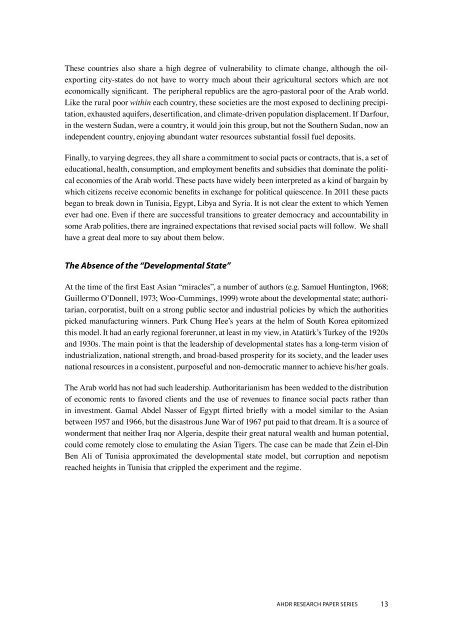<strong>The</strong>se countries also share a high degree <strong>of</strong> vulnerability to climate change, although the oilexport<strong>in</strong>gcity-states do not have to worry much about their agricultural sectors which are noteconomically significant. <strong>The</strong> peripheral republics are the agro-pastoral poor <strong>of</strong> the <strong>Arab</strong> world.Like the rural poor with<strong>in</strong> each country, these societies are the most exposed to decl<strong>in</strong><strong>in</strong>g precipitation,exhausted aquifers, desertification, and climate-driven population displacement. If Darfour,<strong>in</strong> the western Sudan, were a country, it would jo<strong>in</strong> this group, but not the Southern Sudan, now an<strong>in</strong>dependent country, enjoy<strong>in</strong>g abundant water resources substantial fossil fuel deposits.F<strong>in</strong>ally, to vary<strong>in</strong>g degrees, they all share a commitment to social pacts or contracts, that is, a set <strong>of</strong>educational, health, consumption, and employment benefits and subsidies that dom<strong>in</strong>ate the politicaleconomies <strong>of</strong> the <strong>Arab</strong> world. <strong>The</strong>se pacts have widely been <strong>in</strong>terpreted as a k<strong>in</strong>d <strong>of</strong> barga<strong>in</strong> bywhich citizens receive economic benefits <strong>in</strong> exchange for political quiescence. In 2011 these pactsbegan to break down <strong>in</strong> Tunisia, Egypt, Libya and Syria. It is not clear the extent to which Yemenever had one. Even if there are successful transitions to greater democracy and accountability <strong>in</strong>some <strong>Arab</strong> polities, there are <strong>in</strong>gra<strong>in</strong>ed expectations that revised social pacts will follow. We shallhave a great deal more to say about them below.<strong>The</strong> Absence <strong>of</strong> the “Developmental State”At the time <strong>of</strong> the first East Asian “miracles”, a number <strong>of</strong> authors (e.g. Samuel Hunt<strong>in</strong>gton, 1968;Guillermo O’Donnell, 1973; Woo-Cumm<strong>in</strong>gs, 1999) wrote about the developmental state; authoritarian,corporatist, built on a strong public sector and <strong>in</strong>dustrial policies by which the authoritiespicked manufactur<strong>in</strong>g w<strong>in</strong>ners. Park Chung Hee’s years at the helm <strong>of</strong> South Korea epitomizedthis model. It had an early regional forerunner, at least <strong>in</strong> my view, <strong>in</strong> Atatürk’s Turkey <strong>of</strong> the 1920sand 1930s. <strong>The</strong> ma<strong>in</strong> po<strong>in</strong>t is that the leadership <strong>of</strong> developmental states has a long-term vision <strong>of</strong><strong>in</strong>dustrialization, national strength, and broad-based prosperity for its society, and the leader usesnational resources <strong>in</strong> a consistent, purposeful and non-democratic manner to achieve his/her goals.<strong>The</strong> <strong>Arab</strong> world has not had such leadership. Authoritarianism has been wedded to the distribution<strong>of</strong> economic rents to favored clients and the use <strong>of</strong> revenues to f<strong>in</strong>ance social pacts rather than<strong>in</strong> <strong>in</strong>vestment. Gamal Abdel Nasser <strong>of</strong> Egypt flirted briefly with a model similar to the Asianbetween 1957 and 1966, but the disastrous June War <strong>of</strong> 1967 put paid to that dream. It is a source <strong>of</strong>wonderment that neither Iraq nor Algeria, despite their great natural wealth and human potential,could come remotely close to emulat<strong>in</strong>g the Asian Tigers. <strong>The</strong> case can be made that Ze<strong>in</strong> el-D<strong>in</strong>Ben Ali <strong>of</strong> Tunisia approximated the developmental state model, but corruption and nepotismreached heights <strong>in</strong> Tunisia that crippled the experiment and the regime.AHDR RESEARCH Paper series13
2. <strong>The</strong> Policy Process <strong>in</strong> the <strong>Arab</strong> World<strong>The</strong> policy process, to borrow a concept from <strong>in</strong>ternational relations, is a two-level game. At thefirst level, public authorities devise and apply policies <strong>in</strong> order to shape the behavior <strong>of</strong> citizens<strong>in</strong> ways the authorities judge useful or productive. <strong>The</strong> citizens may or may not share the preferences<strong>of</strong> their leaders. Policies, <strong>in</strong> essence, structure <strong>in</strong>centives and dis<strong>in</strong>centives, encourag<strong>in</strong>gpeople to act <strong>in</strong> certa<strong>in</strong> ways and punish<strong>in</strong>g them if they fail to do so. A tax on gasol<strong>in</strong>e may bedesigned to encourage public transport, discourage the use <strong>of</strong> the private automobile and punish,exorbitant outlays on gas, those who cont<strong>in</strong>ue to drive gas guzzlers. At the second level, we musttry to understand the <strong>in</strong>centive system(s) with<strong>in</strong> which the policy-makers themselves function.In the macro-political sense, what are they try<strong>in</strong>g to achieve, what must they avoid, and what arethe rewards and punishments for each? In all respects, level two dom<strong>in</strong>ates or at least heavily<strong>in</strong>fluences level one.When it comes to the policy process <strong>in</strong> the <strong>Arab</strong> world, the gentles objective used to describethis policy process <strong>in</strong> most <strong>Arab</strong> polities is “opaque”. Rarely do we get a sense <strong>of</strong> the <strong>in</strong>terplay<strong>of</strong> public op<strong>in</strong>ion, <strong>in</strong>terest groups, legislatures, executive authorities and <strong>in</strong>ternational actors thatset agendas, formulate policies, and apply them. 3 <strong>The</strong>re are a number <strong>of</strong> reasons for this. Until2011, various forms <strong>of</strong> authoritarian governance prevailed <strong>in</strong> the <strong>Arab</strong> world (a phenomenon thathas spawned an extensive literature <strong>in</strong> its own right: see: Elbadawi and Makdisi, 2007; Ottoway,2008; Brownlee, 2007; Baakal<strong>in</strong>i et.al., 1999; Poususney and Angrist, 2005; Schlumberger, 2007,Owen, 2012; Brown, 2012;). Accountability and transparency are notable for their relative absence.Because so many regimes are dom<strong>in</strong>ated by stakeholders <strong>in</strong> the security and military apparatus,many policy issues are ‘securitized’, fall<strong>in</strong>g, it is claimed, <strong>in</strong>to the no-go zone <strong>of</strong> nationalsecurity. Indigenous scholars, concerned for their long-term survival, do not or cannot undertakeresearch on policy issues that are deemed sensitive. <strong>The</strong> stakeholders themselves seldom writeabout the agenda-sett<strong>in</strong>g and decision-mak<strong>in</strong>g process because to do so would be dangerous forthem as well, or they do not have the habit <strong>of</strong> record<strong>in</strong>g the processes <strong>in</strong> which they participated(a notable exception is Majali, Anani and Haddad<strong>in</strong>, 2006). Outsiders who may be privy to theseprocesses, like World Bank or IMF experts, are bound by confidentiality agreements with hostgovernments. 4 <strong>The</strong> <strong>Arab</strong> world has apparently taken to heart Bismarck’s famous warn<strong>in</strong>g that nohuman should ever be obliged to observe the mak<strong>in</strong>g <strong>of</strong> sausage or <strong>of</strong> legislation.What we have <strong>in</strong> abundance are studies that chronicle policy changes and derive from what happenedwho the stakeholders were and which ones prevailed. This is quite different from and lesssatisfactory than direct observation or participation. Such derivations may or may not be accurate,but they do conform to the observed facts. <strong>The</strong>se analyses are <strong>in</strong> essence post hoc rather thanpredictive. We also have <strong>in</strong> abundance studies that state what should be done, but they tend to bede-contextualized and do not suggest how the recommendations can be implemented. For example<strong>in</strong> the 2010 World Development Report: Development and <strong>Climate</strong> <strong>Change</strong>, the authors state:“<strong>Climate</strong> change requires public <strong>in</strong>terventions to address the multiple market failuresdriv<strong>in</strong>g it—the failures <strong>of</strong> pric<strong>in</strong>g; <strong>of</strong> research and technology development;14 THE POLITICAL ECONOMY OF CLIMATE CHANGE IN THE ARAB REGION
















